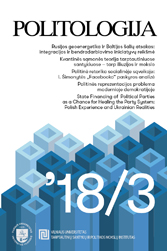POLITINĖS REPREZENTACIJOS PROBLEMA MODERNIOJE DEMOKRATIJOJE
DOES MODERN DEMOCRACY REPRESENT THE PEOPLE?
Author(s): Gintas KaraliusSubject(s): Political Philosophy, Political Theory, Politics and society, History and theory of political science, Sociology of Politics
Published by: Vilniaus universiteto leidykla & VU Tarptautinių santykių ir politikos mokslų institutas
Summary/Abstract: The purpose of this article is to suggest an innovative theoretical approach to modern democracy and its implicit contradiction between the idea of public sovereignty and the model of political representation. The apparent practical problem arising from this contradiction is the lack of legitimacy in democratically elected officials and parliament in general. The article argues that the issue with democratic representation cannot be explained sociologically, but must include a theoretical analysis of the normative contradiction between the egalitarian principle of sovereignty of the people and the hierarchical model of political representation. The article develops its argument from the conceptual framework laid down in the political theory of Montesquieu. Montesquieu’s thoughts on political regimes offer important insights about modern representative democracy, highlighting the structural relationship between what he called the “nature of democracy” (the rule of the people) and the “generating principle of democracy” (love for equality). Three contemporary interpretations of Montesquieu’s theory (by Fred Dallmayr, Michael Mosher and Sharon Krause) are introduced and critically evaluated.
Journal: Politologija
- Issue Year: 2018
- Issue No: 3 (91)
- Page Range: 139-165
- Page Count: 27
- Language: Lithuanian

